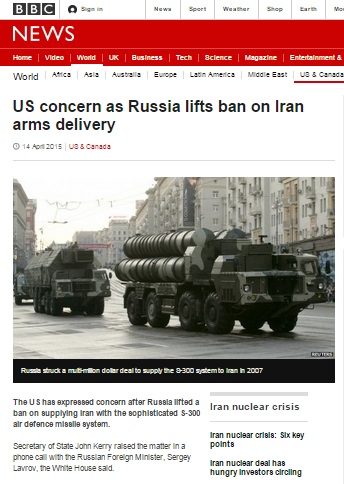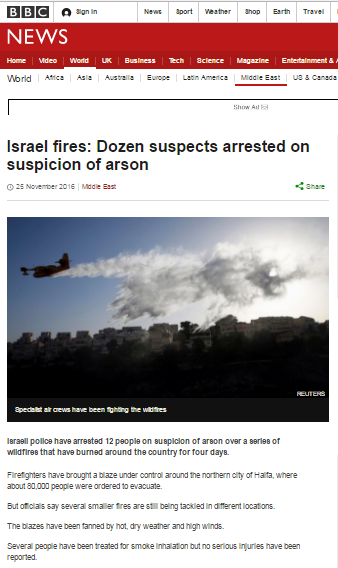Over the last couple of weeks BBC audiences have been repeatedly informed that the essence of the framework agreement reached between the P5+1 and Iran on April 2nd is restrictions on Iran’s nuclear programme in return for the gradual lifting of sanctions following verification of Iranian compliance.
For example: [all emphasis added]
“”Under the agreed-upon parameters, sanctions will be suspended in a phased manner upon verification that Iran has met specific commitments,” [US State Department] spokesman Jeff Rathke told reporters.” [source]
“According to the framework agreement, sanctions will be gradually phased out as the global nuclear watchdog, the International Atomic Energy Agency (IAEA), confirms Iranian compliance.” [source]
“The deal aims to prevent Tehran making a nuclear weapon in exchange for phased sanction relief.” [source]
“Under the terms reached last Thursday, Iran must slash its stockpile of enriched uranium that could be used in a nuclear weapon, and cut by more than two-thirds the number of centrifuges that could be used to make more.
In return, UN sanctions and separate measures imposed unilaterally by the US and EU will be gradually suspended as the global nuclear watchdog, the International Atomic Energy Agency (IAEA), confirms Iranian compliance.” [source]
So, when one of member of the P5+1 group which negotiated that framework agreement announced that it was unilaterally terminating a five year-old ban on the supply of missiles to Iran before the terms of a final deal have been reached and before the IAEA has given any confirmation whatsoever of Iranian compliance with an agreement not yet even written down, one might have thought that the many obvious issues that raises would feature in the report on the subject produced by the self-declared “standard-setter for international journalism”.
However, in the article titled “US concern as Russia lifts ban on Iran arms delivery” which appeared on the BBC News website on April 14th, readers were not even reminded that Russia is one of the P5+1 nations.
Audiences were informed that:
“The US has expressed concern after Russia lifted a ban on supplying Iran with the sophisticated S-300 air defence missile system. […]
Russia said the embargo was no longer necessary after an interim deal was reached on Iran’s nuclear programme.
Tehran and six world powers aim to reach a final deal by 30 June.”
No questions were raised by the BBC regarding the issue of whether the framework agreement means that sanctions repeal is open to individual interpretation by countries and organisations or, alternatively, subject to a joint P5+1 decision-making process on which specific sanctions would be lifted when and under what conditions. The potential effects of this unilateral Russian decision (and pre-existing ones) on the functioning of the P5+1 were also not addressed by the BBC.
“Putin’s spokesman, Dmitry Peskov, later confirmed statements by a Russian diplomat that Russia was already supplying Iran with various goods in exchange for oil. Peskov said this trade was not barred under the sanctions imposed by the UN Security Council.
The moves raised alarm bells in Israel and the US, which said a Russian-Iranian barter deal would raise serious concerns and could interfere with sanctions that the United States and other Western nations imposed on Iran over its nuclear program.”
The article states:
“Russia agreed to sell the S-300 system in 2007, but blocked delivery in 2010 after the UN imposed sanctions on Iran over its nuclear programme.
The S-300 is a surface-to-air missile system that can be used against multiple targets including jets, or to shoot down other missiles.”
However, readers were not informed of the implications of the Russian move – and in particular its potential to complicate the option of military action in the event that Iran does not comply with the pending agreement. That omission is particularly remarkable in light of the fact that just days before the publication of this report, the BBC had seen fit to amplify statements made by the US President regarding Israel’s safety – which included the claim that:
“…we still have the options available to me — or available to a future president – that I have available to me right now.”
Once again the self-imposed limitations of BBC reporting on the P5+1 negotiations with Iran are glaringly evident.




